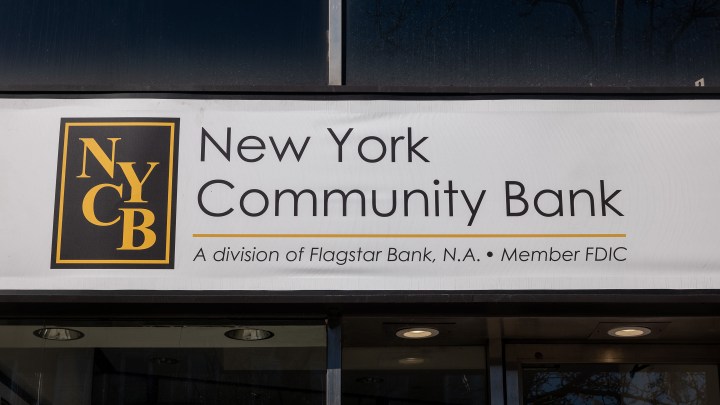
How worried should we be about regional banks and commercial real estate?
How worried should we be about regional banks and commercial real estate?

Near the beginning of February, we got some worrying news from the banking world. The credit rating agency Moody’s downgraded New York Community Bancorp’s rating to junk status. Meanwhile, NYCB reported major losses tied to commercial real estate loans that went sour.
Commercial real estate is an area that’s been struggling given the way that the pandemic has changed our working and living habits. But is there more trouble ahead for banks with exposure to commercial real estate, or is the risk overblown?
Kevin Fagan is head of commercial real estate economic analysis at Moody’s Analytics, which we should note acts independently from Moody’s credit rating agency. He’s written a new piece on this, and he spoke about it with “Marketplace Morning Report” host Sabri Ben-Achour. The following is an edited transcript of their conversation.
Sabri Ben-Achour: Can you explain the relationship between commercial real estate and banks — specifically regional banks — and why this has so many people worried?
Kevin Fagan: There’s actually one bit of a frivolous reason why people are worried, in that there was some kind of bad data that went around last year that suggested that the banks’ exposure to commercial real estate was higher than it actually is. There was a stat going around that 80% of [commercial real estate] lending was by regional banks. That’s just patently not the case. Now, however, some of those regional banks actually do have high exposure. And there are a lot of loan maturities coming in 2024. And some of those will result in losses.
Ben-Achour: Well, that looks like it’s kind of happening with NYCB. Is NYCB a sign of things to come?
Fagan: In a way, yes, but I think the story is more nuanced than a lot of headlines suggest. Commercial real estate is a — if you think of it, it really is the physical manifestation of the entire economy. You know, so offices are reflective of office-using employment. It really is a mirror to the entire economy. So it does tend to go up and down. But my point is, this cycle has actually been — even for office — relatively benign, in terms of its peak-to-trough vacancy rates. And rents have actually — they haven’t kept up with inflation, but, they have actually been increasing.
But to directly answer your question, it is a sign of things to come, because there will be other banks that have challenges. But they’re not going to see trouble unless they have other issues going on as well, there’s something wrong with their business model. And actually, NYCB had a whole litany of other things going on.
Ben-Achour: We know that a lot of people still work from home. We know that leases are long term, and they’re still getting renewed and renegotiated. What about that picture, specifically for office, does not freak you out?
Fagan: Office is still an extraordinarily important part of the workplace. Obviously, that’s going to evolve into a different picture going forward, but it’s still there as a necessity.
It is not actually unprecedented what’s happening in office. In the 1990s, there was a period of massive consolidation of how companies used office space, where they went from about 250 square feet per employee to half of that, around 125 square feet per employee. But office values and rents continued to go up. And the reason is that we shifted from manufacturing into services, professional services. And so the office-using employment rate grew at a faster pace than the general employment rate and filled the offices up despite the net reduction in demand.
So we’ll see some more banks get in trouble, but the other asset classes that are doing well will help them. If they’re doing well as a business, they’ll fare fairly well. And they’ll have recovery rates, even on their offices, or they can extend those maturities out a little further, particularly where they feel like, you know, that office has a good recoverability.
There’s a lot happening in the world. Through it all, Marketplace is here for you.
You rely on Marketplace to break down the world’s events and tell you how it affects you in a fact-based, approachable way. We rely on your financial support to keep making that possible.
Your donation today powers the independent journalism that you rely on. For just $5/month, you can help sustain Marketplace so we can keep reporting on the things that matter to you.


















